#cornell doubles
Note
I want to ask can we win the doubles?
Because I am not able to even after multiple replays 🥲
Awww, sorry to hear that, but yes it's possible!
My advice is to make sure your condition is as high as you can get it, don't eat nothing (or if you're eating a full meal, don't serve first) and milk the (fake) argument does make things slightly easier (at least where winning that particular game is concerned).
Other than that, it's pretty much based on your stats and playing to those, so no easy answers I'm afraid!
All the best!
#ct:os#college tennis: origin story#if#interactive fiction#rayyan#tobin#doubles match#cornell doubles#asks
63 notes
·
View notes
Text
okay noah is an ignorant idiot and people are more than welcome to criticize him and his actions, but can some of y'all be normal 💀 bc apparently twitter doxxed his fucking dorm location and are asking upenn students to assault him on campus. i literally cannot think of any reason why this would be okay. if you don't support him, if you hate him — 100% fine. but don't dox him and advocate for him to be violated wtf????
#noah schnapp#also noah's stance is about the fact that jews are safe in israel so if you beat him up he's literally going to double down on that#trigger assault#trigger violence#i didn't really wanna talk abt him mostly cuz i think everyone talks about him way too much#but i am wholly against praying that he gets killed or assaulted or whatever vindictive fans have against him#also even if those people were “joking” it's not funny especially considering antisemitism on campus#including another ivy league school (cornell) calling the cops a student who threatened to kill jewish students
180 notes
·
View notes
Text

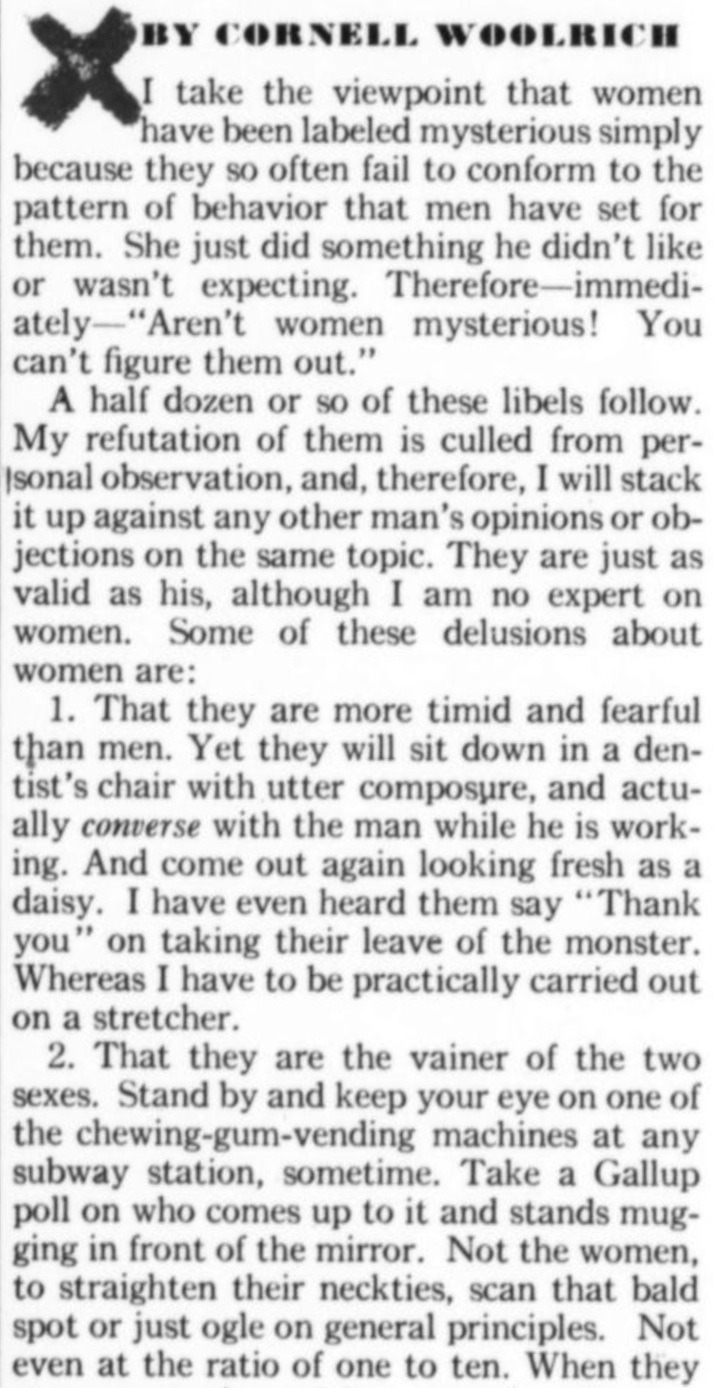
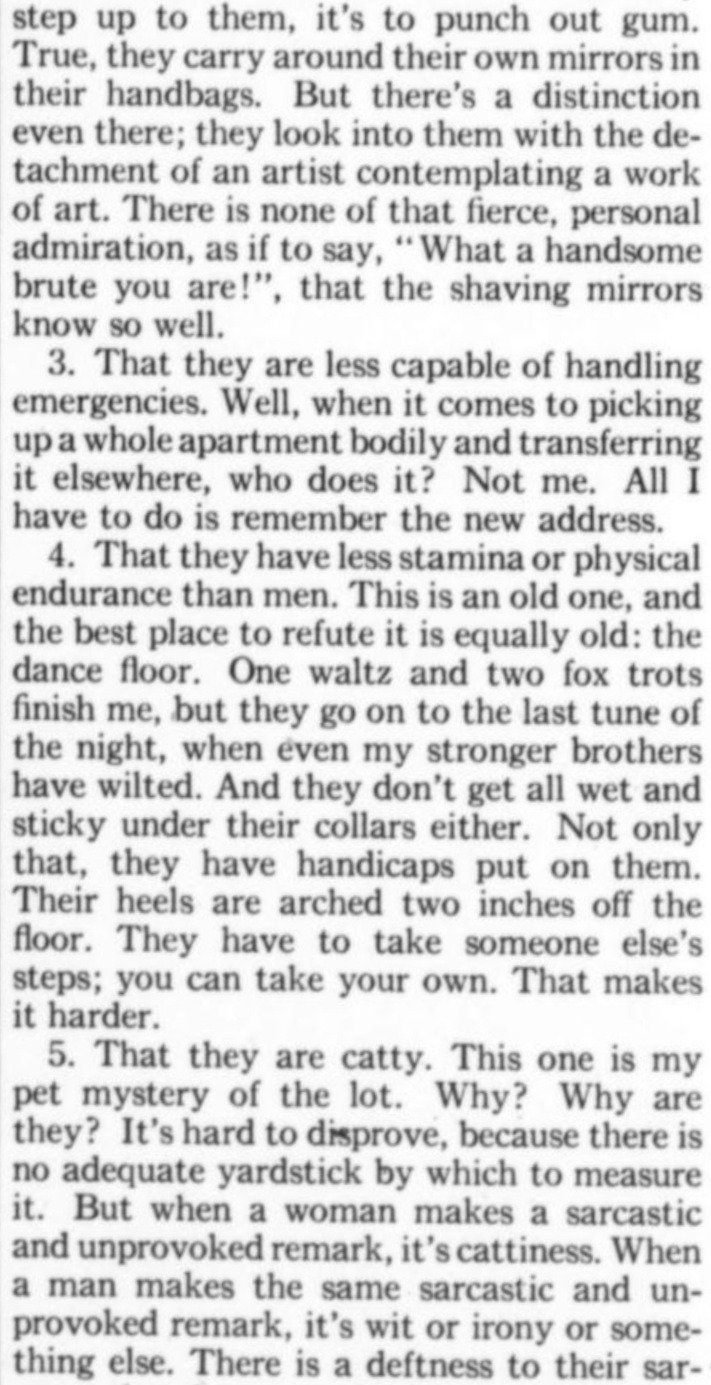
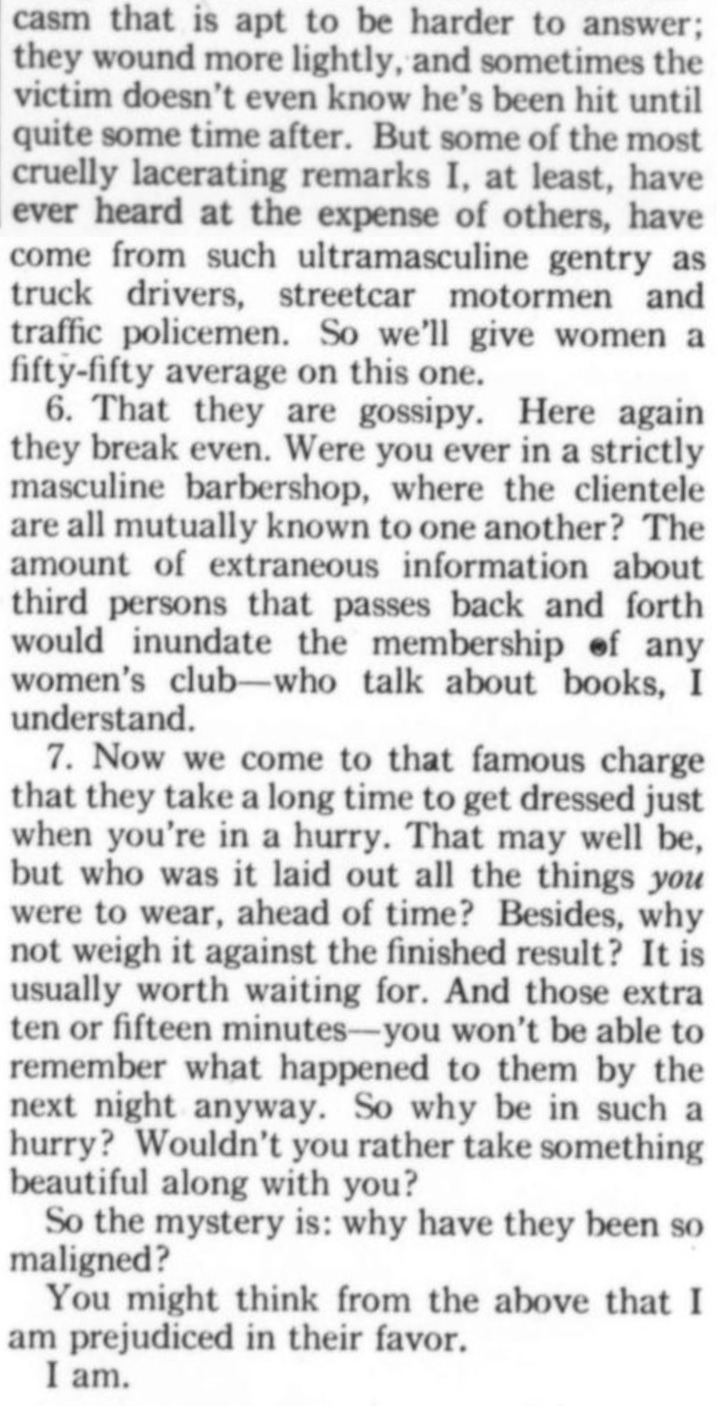
From Ladies’ Home Journal, July 1944.
#cornell woolrich#i love him so much in such a platonic parasocial way#and true to all my previous celebrity(ish) crushes he's long dead lololol#but seriously one of my favorite aspects of his writing is when he subtly (or not so subtly) drags his own sex#❤️#personal#?#(let's try this again#last night it just WOULD NOT load that fourth image for some reason#...oh good it actually worked!)#anyway it's fascinating to read his answer versus the answers from other then-popular male mystery writers#like his is literally the only one that's like ''have you considered...double standards???''
3 notes
·
View notes
Video
youtube
Chris Cornell: Watching The Wheels (Official Video)
#chris cornell#watching the wheels#no on sings like you anymore#soundgarden#john lennon#double fantasy#1980s music#2020s music
4 notes
·
View notes
Text
Over twice as many workers hit the picket line last year as they did in 2022 — and you can thank actors, writers, and UAW members for the massive increase.
A new annual report from the Labor Action Tracker, compiled by the School of Industrial and Labor Relations at Cornell University and the Labor and Employment Relations School at the University of Illinois, tracked work stoppages across the country.
The report finds that, in 2023, there were 470 work stoppages — 466 of which were strikes.
In total, around 539,000 workers were involved in work stoppages last year. That’s up from around 224,000 in 2022. The report attributes that uptick to the sweeping, headline-making strikes by workers in Hollywood, the auto industry , theKaiser Permanente healthcare system, and Los Angeles schools.
139 notes
·
View notes
Text
The Odyssey | Prologue | Bradley Bradshaw (18+)

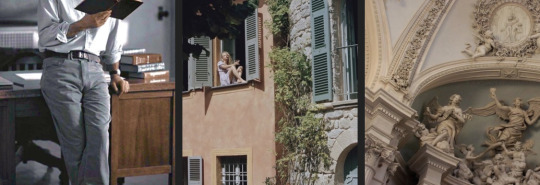

Masterlist | Next Chapter
Bradley wakes up in a foul mood, your ego takes a hit. A deal is struck to ensure that you’ll be able to graduate.
warnings: enemies to lovers, power imbalance (professor / student relationship), age gap (22 / 33), will be smut, virgin reader, swearing, infidelity. warnings to be added on a chapter by chapter basis. 18+ minors dni, wc: 3.1k
…
Nine weeks into Spring semester, six to go. Six more weeks of having scalding coffee, missing tastebuds and a fucking freshman girl ranting into his ear all before the clock even hits 8am. Bradley’s sunglasses sit perfectly across the bridge of his nose, gold-framed Ray-Ban caravans that hide how late he was up last night. This means that sweet, little freshman Bettie O’Riley can’t see the look that he’s giving her as she jogs along to keep up with him.
Hallowed halls, filled with young adults that either reek of cheap beer or Daddy’s money, all signs would suggest that Bradley isn’t supposed to be here. Only thirty-three, sitting at that awkward age that makes him neither a frat boy nor a balding tenured ex-businessman turned lecturer. And yet, his brown leather shoes hit these aged floors every morning on the way to his first class of the day.
Beige, almost cream-coloured, wide pleated dress pants and an untucked blue shirt, rolled up at his forearms and missing the top button. His messenger bag draped from his shoulder, his tie balled into the hand holding the to-go double shot espresso.
Six more weeks until he’s in Italy for two months, teaching during the mornings, free as a bird in the evenings. Sun on his face, limoncello on his tongue; good books, women who don’t just giggle and twirl a strand of their hair at him. History. All funded by the Cornell school of Arts and Sciences. He damn near sighs at how badly he wants to be there now.
“Bettie, I already told you,” He sighs, adjusting the gold-framed sunglasses and shooting a look down at her and her wispish black, curled bob. “I can’t curve your grade, it was a C minus.”
She speeds up and steps in front of him, walking backwards now. “Please, Professor Bradshaw. I’ll do anything.”
Professor Bradshaw rarely draws a reaction from him these days. Only his bosses and parents call him that. He makes a point of scrawling it across the chalkboard at the beginning of each semester, but he’s usually still reminding kids a couple of weeks in to just call him Bradley.
Still, both he and Bettie O’Reilly know that it isn’t her method of address that makes him scoff at her. He stops walking and pushes his sunglasses up into the feathery brown curls that adorn his face, staring down at her like she’s even younger than she is. She swallows, regret flooding her. The other professors usually lean into the kind of virginal, good-girl, bad student thing that she’s got going on.
“Bettie,” Bradley speaks slowly for her, pink lips against tanned skin. Warm eyes against a cold stare. The hallways are full around them, standing stationary in the steady stream of students. “Don’t come onto me like that again. Study.”
“Yes, Sir.”
“Alright, come to my office tomorrow morning, I’ll give you an extra credit assignment,” It’s more lenient than he should be with a girl who just propositioned him before he has even finished his morning coffee, but Bradley knows not to blame little Bettie. With those thick, rounded glasses and dark freckles, he knows that she gets a lot of attention from her other professors. The culture they’ve created in this school isn’t her fault. Neither is the fact that Bradley’s class is notoriously hard to pass. “We’ll talk through what an A grade paper should be looking like. Do me a favour and don’t talk to me until then.”
He steps around her and continues; she’s swallowed instantly by the sea of bustling students. In the run up to the end of the semester, people start showing up to class again as it hits them that their professors might actually fail them. There aren’t too many F’s floating around in a school like Cornell. Its stats are exceptionally high, especially these past few years. It would seem that, in a school like Cornell, a passing grade quite simply has a price tag on it.
Three minutes before his morning class is due to start, and having woken up on the wrong side of his bed, Bradley drops his sunglasses back down over his eyes as he strolls into the lecture hall. It’s surprisingly full for a Monday morning. The gossiping never stops when he walks in — he’s not that kind of teacher. He allows the whispering to continue while he sets up his supplies.
There are six people in this room that Bradley has not seen since the first week of class. Every single one of them has a parent that is a benefactor to the university. Front and centre, surrounded by a group of excitedly whispering, well-dressed young women, there’s you. He knows you vaguely, knows that you’re coasting on high B’s. He hasn’t seen you since January, you won’t be passing this class.
“God, look at that rock!” The blonde to your side fawns, grabbing at your hand and lifting it up towards the light to get a better look. Setting his sunglasses down on the desk, Bradley looks too. There’s a silver band with a big diamond on it around your ring finger. You’re beaming. Dressed in a white turtleneck and fitted blue jeans, Bradley’s got his assumptions about the family you come from, and the family you’ll be marrying in to.
You’ve been taking his classes for the full three years that he has been teaching here. He knows your boyfriend. Malcolm something something the third. Maybe fourth. His Daddy paid for the science wing refurbishment last year. Bradley remembers the night that your Prince Charming ditched you out in the snow, drunk out of your mind. You probably don’t remember that night.
“Good morning.” His booming voice obliterates the pleasant chatter coming from your friend group. You cross one leg over the other and look downwards at the glimmering rock on your finger.
Six more weeks until you’re out of this hellhole. An apartment in Manhattan all lined up and Mac’s place with his father’s firm long confirmed by now, it’s all coming into place. You’ll have a summer wedding at the end of August, and then you’ll truly begin your life.
“Tell me all about it! Did he get down on one knee?” Veronica nudges her white tennis shoe into yours and leans across to you, tapping her pen against the white-lined page of her notebook. Between the two of you, Catherine readies herself to take down notes that you’ll copy later.
A decent string of A to B grades and a diploma, that was the agreement, and then your life is all yours. That was all your father had held you to. You hadn’t ever promised to do something with the degree he had paid for.
Why would you? — Your mother hadn’t. She had studied literature, made friends for life, and met her husband. Then, she began her life. Having her children, shopping in the afternoon, tennis on the weekends. Bliss.
“Of course he did!” You confirm eagerly, leaning over Catherine to continue the conversation.
The first five minutes of a lecture determines everything. If he loses their focus now, then he might as well leave now and take an especially early lunch. He starts off with a quick reminder of their upcoming exam, and a nod towards last week’s discussion of Roman literature.
His attention is quickly diverted to the excited whispering happening six feet from him, right in the front row. Your friends aren’t bad students. You weren’t ever a bad student. It has just become clear that you were in college to find a husband, and now you’ve found one. Bradley’s eyes narrow in on you and your preppy, little friends, giggling at the front of his class.
Exhausted, overworked and underappreciated, Bradley stares at you calmly. You conversation comes to a slow stop as an awkward air of silence fills the lecture hall. He’s just standing at the front, staring right at you, waiting for you to shut up.
“Sorry, Bradley, somebody just had some exciting news.” Catherine smiles shyly at him. He knows her the best out of the three of you. She TA’d for him last year. Great girl, really bright future — to generous when it comes to grading. It’s because of his respect for her that he doesn’t jump to humiliating you right away.
“I can see that, congratulations,” His tone is dry, broad shoulders squared, his face unamused as he looks to you. You stare back at him calmly, giving a curt nod — less than polite in your mannerisms. “Now, if those of you that still have a chance of passing this class could please turn your attention back to me, we’ll give the blushing bride her moment afterwards.”
He opens the little brown, leather bound book in his hands and clears his throat, assuming that your rude interruptions are done for the day. Somehow, the awkward silence that sits heavy in the room grows to an even deeper low after you retort.
“Excuse me?”
“You’re excused.” Bradley deadpans, bored. You squint at him, six feet between the two of you and a lifetime of differences. Unimpressed by his joke, you roll your eyes right away.
Sitting there, you cross one leg over the other and sit forwards, frowning at him. He doesn’t fit in around here and you do, perhaps that’s where his problem with you stems from. Perhaps it’s the lack of ring on his own finger. “Why would you assume that I wouldn’t pass your class?”
As much as he knows of you, you know of him too — he’s supposedly a jackass. “Because you missed half of the semester. That includes two quizzes and a term paper. There’s no way for you to achieve a salvageable grade in this class.”
When you’re around Malcolm, sometimes he says things that are just so entitled that you’re wincing before he’s even done talking. He can’t help it. He means well. With the amount of time you’ve spent at his family home in the past few weeks, it’s no wonder that words you would normally wince at are spilling from your own lips, “I was planning a wedding, what do you expect from me?”
“Attendance.” Bradley snips. He raises his eyebrows slowly, waiting for you to pack up your pretty, coordinated stationary and walk yourself out of his class.
“But—“
“Goodbye, Mrs. Ashworth. Congratulations again.” Bradley speaks harshly, calling you by a name that isn’t even yours yet like it’s an insult. Like he’s better than you, somehow.
Your pencil slams down onto the half desk in front of you, eyes ablaze. Perhaps the first time you’ve ever been told no. “If you fail me, there will be consequences.”
The silence that fills the classroom this time isn’t awkward. It’s just anticipation, baited breaths, waiting for Bradley to lose his temper. He walks a few paces closer, close enough to smell the cherry scented perfume on each of your pulse points.
His eyes darken as he dips his head just slightly, meeting your gaze. “You’ve got me shaking in my boots, honey. Now, stop wasting my time and get the fuck out of my class.”
There are certain lines that a professor does not cross when working at an Ivy League. Swearing at the daughter of someone with more lawyers than Bradley has living family members, was not his brightest idea. Still, your father is an amicable man — he keeps on saying that — and he wants to work this out. Bradley gets to keep his job, you get to graduate. Everybody wins.
“Classics majors work closely with individual professors in their areas of expertise, often in small classes, and have many opportunities for independent research and travel,” Doctor Kazansky’s voice is calm, teetering on the edge of cold. It’s growing increasingly difficult these days to put up with snotty parents and their snottier children. “I’m sure you understand why attendance would play such a strong part in succeeding in such a major.”
Bradley braces himself against the radiator, glancing down at the watch on his wrist. Real Italian leather that a girl’s grandfather had made for him a few years back. He’s missing happy hour for this circus.
“Of course I understand, Doctor Kazansky,” Your father might as well be a parrot for how well he has learned to mimic tone. You cross your legs at his side and sit up a little straighter. The way you tense up at his voice is so routine, it’s almost Pavlovian. Bradley watches wordlessly. “Just like I’m sure that you understand that in this university’s hundred year history, it has never failed a member of my family and my daughter will not be the one to tarnish our impeccable reputation here.”
You glance up quickly, catching the look on Bradley’s face. He squints disapprovingly at your Charles Dickens villain of a father.
“What can she do to bring her grade up?”
Now that, admittedly, does come as a surprise. This isn’t the first meeting that Bradley has been called into where someone’s parent demands a better grade. It is the first where he hasn’t seen them resort to bribery before they finally blame their kid.
“She missed over half the semester,” Bradley answers perhaps too quickly, still hot from the way you had spoken to him earlier. He gives a nonchalant shrug of his shoulders and looks at your father rather than you. “Two quizzes and a term paper. Even if I gave her extra credit, she couldn’t pull her average above a D.”
Your father’s face doesn’t react at all to this information. Instead, he turns his attention back to the Dean and rests his hands on the armrests of the chair, slowly raising his eyebrows.
“What about the Italy trip?” Doctor Kazansky looks to Bradley, sitting back in his chair. Bradley stares blankly back at him. “There were two empty spaces from what I remember. Is that correct?”
“For research assistants,” Bradley’s tongue drips venom, his brown eyes dark and his arms folded across his chest. You narrow your eyes at him, knowing that an insult is coming next. “She can’t research what she doesn’t even understand.”
“But, if she were to complete extra credit for the rest of the semester and then accompany you for your research, she would have enough credits to pass your class and then graduate.” Doctor Kazansky explains, more for your father’s benefit than Bradley’s. Bradley already knows this.
He grits his teeth, eyes darting across to you. His only solace is that you look just as dismayed about the proposal as he does.
“I’d graduate late.” You point out.
“Better than not at all,” Your father intercepts, pushing his chair back and standing. He carries himself like a man much taller than he really is. “Thank you, Doctor Kazansky. We’ll be in touch about this research opportunity.”
“You can’t just choose to do it, there’s an application process.” Bradley’s tone is far from professional, it’s downright snarky by this point. He doesn’t care. He can’t imagine anything worse than lugging a brat like you around Italy with him for two months, just for you to fail anyway.
You stand to follow your father, ditsy white loafers on the dark oak of Doctor Kazansky’s office floor. Bradley remains where he is, leaning back against that wall with his arms crossed.
Your father smiles across at Bradley and then shoots a look back towards the Dean. It’s smug, knowing. That process doesn’t apply to him. “We’ll be in touch.”
There’s a final look shared between you and the oaf that just cost you your summer in Manhattan — the first time that the two of you have agreed on anything, a silent exchange. Neither one of you wants you to join him on that trip.
He watches you leave, following blindly after your father like a child, then whips his head around to his boss.
“It’ll be good for her, maybe you can actually teach her something.”
“My expertise unfortunately lacks when it comes to setting the table by seven sharp and getting the kids to bed before her husband makes it home.” Bradley scoffs, pushing himself away from the wall and shaking his head as he straightens up.
“Is there something offensive to you about a woman being a homemaker, Professor Bradshaw?” Thomas Kazansky has two daughters. One, is a wife with two beautiful children of her own. The other, is a doctor. Bradley’s been over to their house a few times and he knows that Tom makes a point of it to be equally proud of them both.
“Oh, give me a break,” Bradley rolls his eyes at the notion, despite the subtle truth it holds. He shakes his head. “She deserves to fail and you know it.”
“Well, we’ll see how she does at the end of summer. I’ll be the first to admit my defeat, if she fails.” Tom gives a small smile and a shrug of his shoulders, always too calm for his own hood these days. Apparently he has mellowed with time, Bradley hears that he used to have quite an attitude in his early career.
Pressing his tongue to the inside of his cheek, the younger professor tries to stare his boss down. Tom knows how much these trips mean to Bradley, he takes his work so seriously. Still, Tom just stares back at him, calm.
Squinting, it takes a few moments for Bradley to give up. He turns and growls in frustration, letting the door to Doctor Kazansky’s office slam behind him. His shoes echo through the halls as he storms out of the building and across the quad. Not even Bettie O’Reilly would dare to interrupt his when his face looks as stormy as it does now.
He shrugs his bag off of his shoulder and throws it into the back of the bronco, then shoves his hands into his pockets in search of his keys.
“Do you even understand how hard I have worked for you to have the opportunities that you have had?”
Bradley glances up. He isn’t surprised to find that you’re the one being yelled at. He almost snorts — good, it’s about time someone reigned in that attitude of yours.
You stand, tearful, at the side of your father’s expensive Porsche, your head bowed in shame. Bradley unlocks his truck and pulls himself into the driver’s seat. He figures you probably cry a lot when someone’s telling you no.
“I mean it! — If you ruin this opportunity, don’t even think about coming back. Hopefully Malcolm’s family like you, because they’ll be all that you’ve got, I swear.”
Bradley turns his head slowly. Swallowing to keep from sobbing in the parking lot, shame burns through you as you meet his gaze. Your father towers over you, demanding to know if you’re even listening to him.
Bradley turns the engine on, his brown eyes looking decidedly less scary when he isn’t glaring at you. There’s something else. Maybe it’s pity — you aren’t used to that. He turns his head away and reverses out of the spot.
…
Tags: @thedroneranger @batdanceq @wkndwlff @sunflowerziva @cassiemitchell @himbos-on-ice @bradshawseresinbabe @damrlova @fudge13 @xoxabs88xox @mak-32 @sihtricswife @callsignvenus @callsign-joyride @harper1666 @sheisanangell
#bradley bradshaw#bradley rooster bradshaw#miles teller#bradley bradshaw smut#rooster x you#rooster bradshaw imagine#top gun smut#bradley bradshaw au#bradley bradshaw x reader
509 notes
·
View notes
Text
China’s economy is currently on the operating table, hunched over by surgeons, chest cavity splayed open, hooked up to a cardiopulmonary machine, surrounded by nurses staring at monitors flashing vital signs. It all looks rather grim.
This surgery, however, is not an emergency bypass. That would be too easy. China has had many of those already – stimulus packages, grand infrastructure projects and many rounds of directed lending.
Every two decades or so, going all the way back to the founding of the PRC in 1949, the surgeons get ambitious. These guys are mad scientists attempting a comic book trope – to create the ultimate superhero.
They want to inject super serum, replace skeletal calcium with adamantium and dose the patient with gamma rays, giving China the powers of shazams out the wazoo.[...]
In the lamented “pre-reform” era, China’s mad scientists engineered spectacular growth by increasing investment from a prewar 6% of GDP to 20% in the first Five-Year Plan, covering 1952-1957. This led industrial output to register a compound annual growth rate.
The Great Leap Forward accelerated this growth to 66% in 1958 and 39% in 1959 before crashing and burning in 1961 when mismanagement of communal farms and “backyard blast furnaces” caught up with the mad scientists.
Course correction starting in 1962 recovered all lost ground by 1965. According to economist Cheng Chu-Yuan, China’s GDP growth averaged 11% between 1952 and 1966, the eve of the Cultural Revolution. (T. C. Liu of Cornell and K. C. Yeh of the Rand Corporation have a lower estimate: 8%.)
More importantly, China built a full kit of infrastructure, machinery and equipment capable of driving future industrialization.[...]
Many analysts have a tabula rasa understanding of China’s reform era, as if there had been no economy before Deng Xiaoping. In reality, China’s industrialization started right after the formation of the PRC with some of the fastest growth recorded in the 1950’s and 1960’s. Even during the “low growth” Cultural Revolution, resources directed towards public health (for example, barefoot doctors) and primary education doubled life expectancy and quadrupled adult literacy by 1980 from pre-PRC levels.
The mad scientists are now at it again. They have about twenty years of new data not just on China but from the rest of the world. When Zhu Rongji was head surgeon, history had ended and markets reigned supreme. This time around, the surgeons are correcting for market irrationality and negative externalities. The next twenty years is again being determined on the operating table.
Three years ago, the surgeons pried open China’s chest cavity with the three red lines credit limits, instantly seizing the speculation driven property sector. Since then, they ripped out unnecessary organs like education companies, clamped the Ant Financial artery and eviscerated the video game industry.
All of this has caused spasms in vital signs from lackluster growth to rising youth unemployment. Wondering whether China will or will not stimulate the economy next quarter or next year is missing the forest from the trees. For the next few years, China’s economy will still be under the knife and whatever adjustments will merely be anesthesiologists and technicians nominally dialing the drugs up and down and adjusting the heart-lung machine to maintain vital signs.
What are these mad scientists trying to achieve? We believe President Xi Jinping’s 2020 target of doubling China’s GDP by 2035 stands. That is an average growth rate of 4.7% for 15 years. But beyond just a numerical target, it is important to figure out what superpowers China is trying to acquire. And just as importantly, what Kryptonite factors China is attempting to inoculate itself against.
China wants America’s Silicon Valley, but regulated; Japan’s car companies, but electrified; Germany’s Mittelstand, but scalable; and Korea’s chaebol conglomerates, but without political capture. It wants to lead the world in science and technology, but without cram schools. A thriving economy, but with common prosperity. Industry, without air pollution. Digital lifestyle, without gaming addiction. Material plenty, without hedonism. Modernity, without its ills. This is, of course, a wish-list and unrealistically ambitious. But these mad scientists sure as hell are going to try. They’ve developed a taste for it.
In college, early into the semester, we went through a ritual called course exchange. Students gathered in an auditorium to swap classes after sampling lectures for three weeks – satisfaction was not guaranteed. The strategy passed down to underclassmen applied to both course exchange and significant others: “Add before you drop.”
China is undergoing – but perhaps botching – the same process with a more party-esque slogan, “Establish the new before abolishing the old.”
The surgeons have been on a tear gutting the old. The big kahuna is, of course, the property sector. But right behind are platform monopolies, private education, financial services and video games. The new has been playing catch-up, with 5G equipment, electric vehicles, photovoltaics and wind turbines being leading examples.
From all appearances, the Industrial Party is in ascendance and China will double down on climbing the manufacturing value chain. The Industrial Party is a political identity that believes industry, science and technology should determine China’s future. Adherents believe that China’s strength lie in the technical skills of her population and thus favor hard-science, high-tech industries as opposed to services and business model innovations.
Therefore, Chinese politicians, whatever their predisposition, must find a way to create space for this next generation of scientists and technicians to develop themselves. They cannot be confined to a production line at a Foxconn plant. Maintaining social stability means finding a use for future scientists and technicians, which means pursuing industrialization. Is there any other way? The key variable for determining the course of China’s future development is thus the massive number of talented technical and scientific workers.
If mistakes were made, it would have been in sequencing and in faith – dropping before adding is a poor strategy in both love and course exchange. China’s mad scientists may have been too confident that electric vehicles and renewable energy would be followed quickly by semiconductors, pharmaceuticals and commercial aircraft.
Perhaps they have reason to be confident. Planning for this surgery has been in the works since 2015 with the Made in China 2025 project. China has been steadily eroding imports of high value added intermediary goods like batteries, precision parts and electrical components, flipping trade with South Korea from deficit to surplus.[...]
China never properly transitioned from its Soviet era Material Product System (MPS) of national accounts to the United Nation’s System of National Accounts (UNSNA) standard, leaving out much of services from reported GDP.
We calculate that China accounts for 22-24% of global GDP and 20-23% of global consumption. We also calculate that household consumption is 50-55% of China’s GDP, in line with global averages. China should easily be able to grow at 4.7% through 2035 with only a modest increase in consumption’s GDP share (5 percentage points over 10 years) without upsetting global economic balances.
In the reform period prior to Xi, everything was sacrificed at the altar of economic growth. In the new era, growth has been walked down from 9.6% in 2011 to an average of 4.7% in the Covid years (2020-2023) as an increasing litany of issues were given precedence. Debt however, soared over this time from 175% of GDP to over 300%. What exactly did all that debt buy?
When Xi assumed leadership of China, he declared that inequality could not be allowed to increase further. Inequality is perhaps the major Kryptonite factor of the American economy which China wasted no time in matching as the economy roared with market reforms.
While still problematic, inequality, as measured by the Gini coefficient, has steadily fallen since 2010 largely as a result of massive investment in urbanization, pushing people into cities and pushing cities up the tiering ladder.[...]
China also poured resources into stamping out last-mile poverty. While most poverty alleviation in China was through economic growth, recalcitrant extremely poverty could only be eradicated by concentrated marshaling of resources, from relocating entire villages to weekly visits by social workers.[...]
Since peaking in 2012, air pollution in Beijing has been cut by over 60%, with Shanghai falling over 50%. China, which used to dominate the list of most polluted cities, now only claims one spot in the top 20. None of this came cheap, from installing scrubbers in smoke stacks to increasing renewables to moving heavy industry to strict emissions regulations for cars.[...]
Before Hu Jintao handed the reins to Xi, Hu warned delegates to the 18th Party Congress in 2012 that “[corruption] could prove fatal to the party… and [cause] the fall of the state.” The popular opinion in the West is that Xi ended China’s highly successful reform era because of an ideological bent. This is off the mark. Xi was brought in to clean house as the wheels were coming off from excesses of the reform era.
Throughout Xi’s decade in office, there has been no letup in his anti-corruption campaign. In 2022, a record 638,000 officials were punished for corruption. While there haven’t been any large scale ideological appeals to the public, it’s a different story within the 98-million-member party.
During this time, free market capitalism and liberal democracies also faced their own existential tests. Success or failure going forward will depend on whether liberal institutions remain intact in the West and whether party discipline can be maintained in China.
What the PRC has had since 1949 is a governing party with the political autonomy to play mad scientist. [...]
Of course we live in the real world, not a comic-book world. The question in the real world has always been whether the economy can be engineered by mad scientists from the top down or is it best left to the invisible hand of the market? [...]
The standard economic opinion – against all evidence – is that China was economically stagnant before Deng’s market reforms. The thinking on this for the American economys is undergoing a transformation in egghead land – just how has neoliberal economics benefitted the American people over the past few decades?
In a Q&A exchange at a conference in Malaysia, Eric Li, the barbed-tongued venture capitalist, was asked, “Do you think top-down directives are sustainable in the long run?”
To which he replied, “It’s the only thing that’s sustainable.… That’s why America is failing today.” After World War II, Li said, the Americans “lost the ability to do top-down design.”
Dec 2023
99 notes
·
View notes
Text
2024 US Election Information
We have roughly 1 year until the 2024 US election. I've put in some research, and here are my conclusions.
TLDR for those of you who don't have time or focus: Cornel West (Democratic Socialist running as People's Party -> Green Party) is the ideal candidate to vote for - normally I wouldn't advocate voting third party, but we may actually have a shot for once, and he has excellent policies. Jill Stein (Green Party) is a potential backup, though if West drops out, our best option for Democratic party is Marianne Williamson.
Please spread this information, especially to residents of Texas, Pennsylvania, Georgia, Arizona, Wisconsin, and Nevada. Detailed information under the cut.
Current Fascist and Republican Candidates
Donald Trump, Nikki Haley, Vivek Ramaswamy, Asa Hutchinson, Tim Scott, Ron DeSantis, Chris Christie, Ryan Binkley, and Doug Burgum.
I'm not going to entertain their details, but I will note that the information I picked up while being exposed to alt-right communities from the inside via my fascist parents earlier this year shows strong evidence that Republicans are likely going to split between Donald Trump, Ron DeSantis (viewed as a betrayal by Trump supporters), and openly fascist Robert F. Kennedy, Jr. (I'll cover him later).
My guess is a 6/3/1 Republican vote split between Trump/DeSantis/Kennedy, Jr..
Current Democratic Candidates
Joe Biden, Marianne Williamson, and Dean Philips.
Biden has overall failed to complete the majority of his campaign promises, and has been directly supporting Israel during the genocide of Palestine, as well as deferring to Republicans to be "bipartisan" (I don't think I have to stress enough that a bipartisan democrat is not a democrat) - do not vote for him.
Williamson is a high-school educated 71-year-old author from Los Angeles, California. She is known for being Oprah Winfrey's, "spiritual advisor," (double red flag), and dropped out during the 2020 election (another red flag).
While she supports the reinstatement of Roe v. Wade, the decriminalization of cannabis and psychedelic drugs, the reduction of CO2, and moving to 100% renewable energy by 2035, her advocacy for the outright banning of assault and semi-assault weapons for civilians without military reform of the same is a slight red flag when combined with her relationship with Oprah Winfrey (an Obama supporter, the president who authorized quite a lot of drone strikes in West Asia) and drop-out makes her not a great candidate.
Philips is a Bachelor's (Brown University) and Master's Business (University of Minnesota) educated 54-year-old three-term congressman who is noted for criticizing Biden running for a second term on account of both political moderacy and medical concerns.
Philips unfortunately wants to increase police funding for some reason, but advocated for better training, including mental health training. He also advocates for what he calls, "comprehensive immigration reform," in the form of increased border security and streamlining legal entry (this ignores the problem outlined by the UN that people seeking asylum are likely to have to enter a country illegally before they can seek support), and the only real good stance he has is giving reproductive rights to patients, rather than politicians.
Philips is essentially a moderate Republican, and is a bad candidate. Do not vote for him.
Current Independent Candidates
Fascist (not his stated political stance, but it's what he is)
Robert F. Kennedy, Jr. is a fascist that has openly quoted Nazi propaganda in his political campaigns, is an anti-vaccine activist, and has spread anti-science conspiracy theories such as vaccines causing autism and the non-existence of the SARS-CoV-2 pandemic. I cannot stress this enough, do not fucking vote for Kennedy, Jr.
Democratic Socialist
Cornel West is a Bachelor's (Harvard University), Master's, and Ph.D. (both Princeton University) educated 70-year-old progressive activist that switched his running party from the People's Party to the Green Party, despite being a both public- and self-described democratic socialist.
When asked why he wasn't running as a Democrat against Biden, he stated that, "Neither party is speaking to the pressing needs of poor and working people."
His party plans are a wealth tax on the rich, a national $27 minimum wage, a federal Universal Basic Income, 6 months of paid family leave, a 4-day work week, national free Pre-K childcare, "Immediate cessation of all oil and gas leasing projects on federal lands and waters," "Federal moratorium on fracking, carbon capture, and direct air capture technologies, geoengineering, and other false climate solutions," putting abortion rights in the Constitution, and nationalized healthcare.
Here's where I want to lay out something important. I normally wouldn't advocate for voting for a third party candidate due to the Spoiler Effect, but
Considering the United States' Democratic majority, popular vote records showing a common Republican minority, the absolutely incredible policies West stands for,
The growing support for third parties in the United States, and his policies aligning with public opinion,
Cornel West is the ideal candidate to vote for. Spread this information like wildfire - we may have one shot at the first third party win in US history in the upcoming 2024 election, and
If successful the dominant parties will be Fascist vs. Socialist, denying most, if not all, future Republican wins.
Our target toss-up states are Pennsylvania, Georgia, Arizona, Wisconsin, and Nevada.
Converting Texas to third party, or even just Democrat, will throw the Republican vote entirely and all but guarantee a Democrat, or hopefully third party, 2024 election win,
Which is absolutely possible, as Texas is majority Democrat and wins Republican votes via gerrymandering despite public opinion, which is why it swings occasionally.
Democrat states also need to be switched to majority third party votes, with particular emphasis on California, New York, and Illinois.
GET PEOPLE TO VOTE FOR CORNEL WEST!
Reference map of polling for the future 2024 election:

Libertarian (slightly Conservative to alt-right, really depends on the person)
Chase Oliver is a surprisingly progressive high school educated 38-year-old anti-war Libertarian that left the Democratic party after witnessing Obama's aggressive anti-West Asian war policies who has expressed desires for criminal justice reform and ending wars abroad, though hasn't elaborated on either.
Green Party
Jill Stein is a Bachelor's (Harvard University) and Medical (Harvard Medical University) 73-year-old Jewish doctor who previously ran for and represented the Green-Rainbow Party as the governor of Massachusetts.
Stein is notable for being an activist and protestor who has both protested outside buildings and testified before legislative and other government bodies against coal plants, mercury leaks, and unclean and unsafe groundwater.
Presumably, her stances will focus on environmental protections, trans rights, and Jewish protections, making her a potential alternative should West drop out.
Conclusions:
Again, don't fucking vote for Trump, Haley, Ramaswamy, Hutchinson, Scott, DeSantis, Christie, Binkley, Burgum, Biden, Philips, or Kennedy, Jr..
Our potential backup Democratic candidate is Williamson.
The ideal candidate is West, with Stein as a viable backup.
As absurd as it sounds, I want you to vote third party for Cornel West.
If you want a wealth tax on the rich, a national $27 minimum wage, a federal Universal Basic Income,
6 months of paid family leave, a 4-day work week, national free Pre-K childcare,
"Immediate cessation of all oil and gas leasing projects on federal lands and waters," "Federal moratorium on fracking, carbon capture, and direct air capture technologies, geoengineering, and other false climate solutions,"
putting abortion rights in the Constitution, and nationalized healthcare,
VOTE FOR CORNEL WEST AND GET OTHER PEOPLE TO DO THE SAME.
WE HAVE A CHANCE AT THE FIRST THIRD PARTY WIN IN THE UNITED STATES AND THE DENIAL OF FUTURE REPUBLICAN WINS.
#2024 elections#democrats#democracy#president biden#cornel west#jill stein#marianne williamson#politics#pennsylvania#georgia#arizona#wisconsin#nevada#texas#california#new york#illinois#democratic socialism#socialism#socialist#communism#communist#lgbt#lgbtq#trans#transfem
225 notes
·
View notes
Note
hi! any reading you'd rec on bio politics\necro politics? i've recently gotten curious about the concepts so forgive if this is vague or not specific lol. tyy in advance ! hope ur day is good
so, the standard recs you will usually see for getting a theoretical foundation here are:
Foucault's 1978–9 lecture series at the Collège de France, "The Birth of biopolitics", and his 1975–6 series, "Society must be defended" (there are print series of his lectures) (<-these are honestly overrated as sources imho b/c foucault never fully developed these concepts. i would read lecture 11 from the 75–6 series if you absolutely feel you need some foucault, and then skip to whatever else seems interesting)
Achille Mbembe's Necropolitics (2019)
Jasbir Puar's The Right to Maim: Debility, Capacity, Disability (2017)
there are also lots and lots and lots of books that use concepts of bio/necropolitics in their historical and/or political arguments. some i've enjoyed include:
Joshua Cole, The Power of Large Numbers: Population, Politics, and Gender in Nineteenth-Century France (2018: Cornell University Press)
Daniel Nemser, Infrastructures of Race: Concentration and Biopolitics in Colonial Mexico (2017: University of Texas Press)
Andrew Aisenberg, Contagion: Disease, Government, and the "Social Question" in Nineteenth-Century France (1999)
Mie Nakachi, Replacing the Dead: The Politics of Reproduction in the Postwar Soviet Union (2021: Oxford University Press)
Banu Subramaniam, Holy Science: The Biopolitics of Hindu Nationalism (2019: University of Washington Press)
Kyla Schuller, The Biopolitics of Feeling: Race, Sex, and Science in the Nineteenth Century (2017: Duke University Press)
Michela Marcatelli, Naturalizing Inequality: Water, Race, and Biopolitics in South Africa (2021: University of Arizona Press)
Ellen Amster, Medicine and the saints: science, Islam, and the colonial encounter in Morocco, 1877-1956 (2013: University of Texas Press)
Ron Broglio, Beasts of Burden: Biopolitics, Labor, and Animal Life in British Romanticism (2017: SUNY Press) (<-doubles as an introduction into why the 'animal turn' has been such a hot topic historiographically in the past 5 or 6 years)
James Duncan, In the Shadows of the Tropics: Climate, Race and Biopower in Nineteenth Century Ceylon (2007: Ashgate)
René Dietrich & Kerstin Knopf (Eds.), Biopolitics, geopolitics, life: settler states and indigenous presence (2023) (<-haven't read this yet! some of these essays look very promising)
#book recs#biopolitics#there is also a very interesting chapter in nükhet varlık's book on ottoman empire & plague that makes an argument for usage of#the biopolitics framework centuries prior to the 'classic' 19thc case study. however varlık's book is very long and mostly not about that
121 notes
·
View notes
Text
some completely unrealistic yj headcanons for u x

✦ precrash lottie’s role model was Cher from clueless. both pretty rich girls xxx
✦ jackie had a deathly fear of spiders, but after staying in the cabin she got over her fear
✦ shauna seriously loved Sade, standing on her bed jumping up and down while singing along to kiss of life
✦ mari, despite seeming dumb, had very good grades precrash, especially in science subjects
✦ postcrash akilah (we can imagine) bought multiple hamsters in memory of Nugget, she cried when they ate each other, duh
✦ van had a serious short hair phase. after watching Bound, she love love loved jennifer tilly and wanted to be like Corky.
✦ misty loves her weird phones, as seen before. watching Juno only fueled her love more, and so she bought a hamburger phone.
✦ tai could only sleep with seriously heavy rain, was thrilled when she found ASMR videos
✦ natalie was a FREAK for Chris Cornell (me too)
✦ jeff loves the idea of a double decker couch
okay that’s all ty x
#yellowjackets#yj#shauna shipman#jackie taylor#natalie scatorccio#akilah yellowjackets#mari yellowjackets#lottie matthews#van palmer#taissa turner#misty quigley#jeff sadecki#headcanon#lesbian#wlw#some inaccurate#that’s the point#okay#bye
38 notes
·
View notes
Text
I don't know how to share the video, but it is worth watching because of the utter insanity of what is said in there.
The double standards, the refusal to condemn Hamas, and to recognize facts as facts is astonishing. As well as the amount of times the using "I have a Jewish friend/family member" gets pulled out, it is distgusting.
The way that Cornell West and Melina Abdullah speak about Jews, the ones that they use in that gross manner, is done in a certain way that made my skin crawl to be honest.
I don't know how to explain it, but it was very creepy and yucky. Almost like they were talking about a breed of animal rather then fellow humans.
The way the both of them refuse to acknowledge the idea of a Jewish state existing at all, and then go into to saying Israel isn't a Jewish state, but a Zionist one and the two should be confused is concerning to say the least.
It shows a lack of understanding as to what Zionism is as well and ignores the reality of what Israel is, what is means to Jews, just how many Jews live there, why they live, the history of Israel, the history of Jews, and what the loss of the State of Israel would have on Jews both inside of and outside of Israel.
It shows that there is no concern or care for Jews and our reality.
12 notes
·
View notes
Note
Hol up. You can have a fake fight during the doubles match against Cornell???.?!
I feel bad for asking again but.... How???
HEHE. I know you've found it now, but for everyone else's benefit: just don't win too early!! I think it's now roughly in the sixth / seventh game. (It's in the update that'll go out to the public on the 21st)
Also, I've now added an option for MC to REALLY fight with their doubles partner. Just for the folks who like being combatant. Also, inspired by JBento on the COG forums, who really does want to beat Rayyan up.
#college tennis: origin story#ct:os#if#interactive fiction#asks#tobin#rayyan#doubles partner#cornell#cornell doubles
53 notes
·
View notes
Note
I am so done with myself-
I won the doubles match and completely forgot to save the password-
There's a list of passwords on ko-fi! It's been updated to include the cornell match :)
26 notes
·
View notes
Text
Donald Trump's Hate Has No Place in Black America. Let's Remind Him in November.
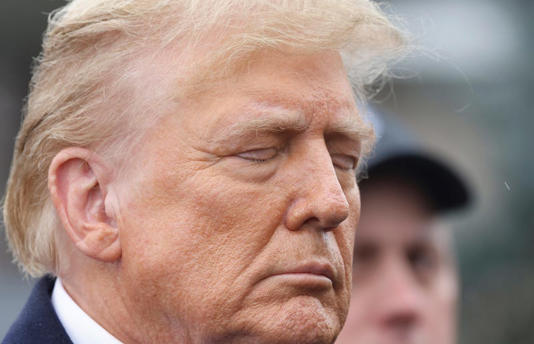
We are seven months out from the most consequential election in our nation’s history, and Black voters know what’s up: A recent survey conducted by Black pollster Cornell Belcher’s firm asked 800 Black voters in battleground states to identify the single greatest threat to the Black community.
Their answer? A second Donald Trump presidency.
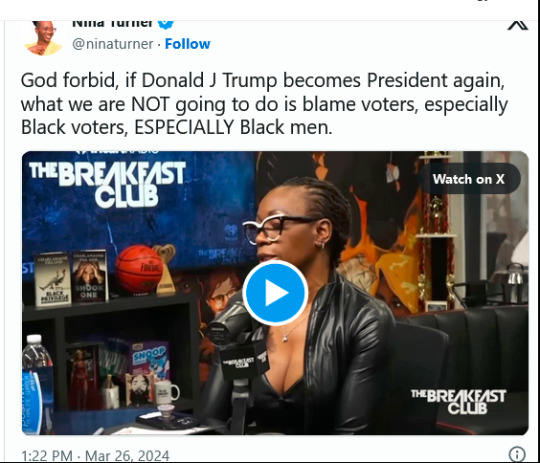
We should not be surprised by this finding. Trump is prepared to enact – and in many cases, reenact – policies that will do great harm to the Black community and to communities of color. He is expected to authorize mass deportations, wage war on the federal civil service (of which Black employees comprise 18 percent), cut taxes for the rich at the expense of the middle class, fight to make healthcare more expensive and less accessible and support an abortion ban that will only worsen the maternal mortality crisis.
While we have focused a lot on what Trump would do during a second term with the stroke of his pen, we cannot forget about the damage he inflicted on our community as president without even lifting a finger. Over his four years in office, Trump normalized a culture of racism and xenophobia that trickled down from the highest levels of our government to everyday interactions in-person and online. The former president’s social media posts and speeches were laced with a mix of dog whistles and outright hate speech.
How could we ever forget his claim that the attendees of a white supremacist rally in Charlottesville, Va. were “very fine people?” Or when he ordered members of the Proud Boys to “stand back and stand by” after being asked to condemn the white nationalist militia group? Or when he suggested that four Democratic members of Congress – all women of color – should “go back…[to the] places from which they came” in a tweet that a Republican congressman even described as racist?
Coming from the mouth of the President of the United States, this kind of rhetoric signaled that hate did indeed have a place in his America and gave top cover to those who realized they no longer had to keep their racism under wraps.
Consequently, racial violence skyrocketed during Trump’s presidency. In fact, this trend started before he even took office. The Washington Post found that counties that hosted a Trump rally in 2016 experienced a 226 percent increase in hate crimes in the months that followed. From 2016 to 2017, hate crimes across the country increased by 17 percent. From 2018 to 2019, deadly hate crimes more than doubled. And in 2020, more hate crimes were reported than in any year since 2001. Perhaps unsurprisingly, alleged civil rights violations went under-investigated under Trump’s DOJ. During its first two years, the Trump DOJ opened 60 percent fewer civil rights cases than did the Obama DOJ and 50 percent fewer than the Bush DOJ.
For those who think that the extent of the harm inflicted by Trump’s racism can be fully captured in those statistics, think again. In a multitude of ways, the Black community continues to suffer from the flames of hatred that Trump fanned while he was president. For example, racism is exacerbating the Black mental health crisis: Black youth experienced a 144 percent increase in suicide rates from 2007 to 2020, with both institutional and interpersonal racism identified as strong risk factors driving this trend.

While Trump was president for only a portion of that period, he was active in spreading racism – including promoting the Barack Obama birtherism lie – for almost the entirety of it.
Speaking of Obama, the election of our nation’s first Black president helps us understand why the election of Trump – which once seemed unthinkable – was actually an inevitable reaction to Black progress. Study after study has pointed to racial resentment as a significant driver of the support Trump received from his voters. His base wanted trickle-down racism, and trickle-down racism is what they got.
Fast forward to today, and like any other proverbial old dog, Trump is clearly stuck on his old tricks. On the campaign trail this time around, he has already evoked Hitler, saying that immigrants are “poisoning the blood” of our country, and suggesting that Black voters appreciate him because he is being “discriminated against” in the legal system. Naturally, Republicans have made him their nominee for the third time. But while he might speak for their party, we do not have to let him speak for our country. Not again.
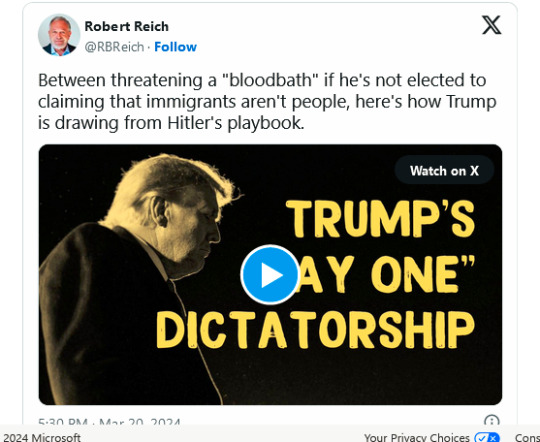
In 2016, Trump promised his supporters the ability to hate openly with impunity, and he most certainly delivered. Now, he’s ready to do it all over again. And while it might be tempting to give into fear and cynicism, we should take hope in recognizing that thanks to our community showing up for Joe Biden in 2020, we helped elect a president who is committed to aggressively prosecuting hate crimes, who has appointed judges with a respect for civil rights, and who recognizes that “hate never goes away, it only hides.”
Donald Trump has never hidden his hate. This fall, let’s show him once again that it has no place in our America.
#Donald Trump's Hate Has No Place in Black America. Let's Remind Him in November.#trump#white supremacy#white hate#white lies#american hate#homegrown racism#race#race in america
12 notes
·
View notes
Text
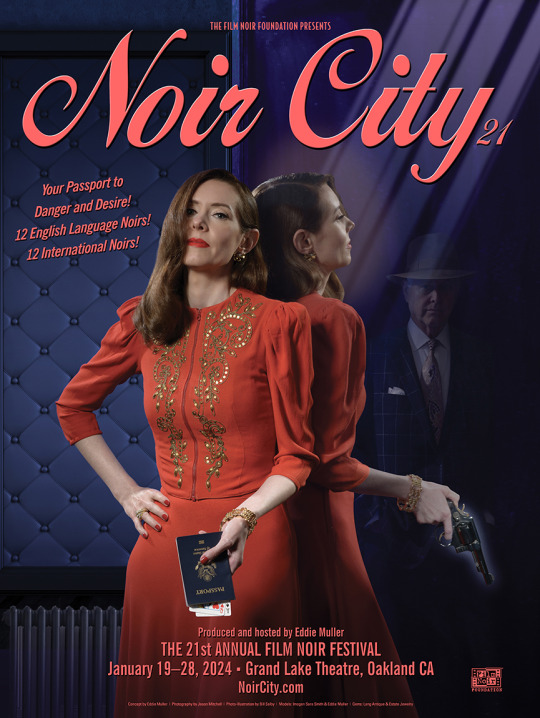
NOIR CITY 21
Celebrating its 21st year, NOIR CITY, the largest annual film noir festival in the world, returns to Oakland's Grand Lake Theatre, January 19-28, 2024. FNF president Eddie Muller will present a dozen double bills pairing an English language noir with a similarly themed foreign language film—24 films over 10 days. Whatever the country of origin, there are heists, prison breaks, missing persons, cultural alienation, love triangles, and lots of plain old-fashioned murder.
Muller says this edition "has been tailored to satisfy those folks who love noir filled with the colorful vernacular slang so essential to American and British noir—as well as adventurous viewers intrigued by seeing a familiar story—typically a crime committed for passion or profit—play out in cultures with different values, mores, and styles." Through his programming of NOIR CITY festivals around the nation and his hosting of the popular Noir Alley franchise on Turner Classic Movies, Muller aims to move audiences past the idea that film noir is a strictly American genre.
Joining him this year, as co-programmer and co-host, is acclaimed film scholar Imogen Sara Smith, a familiar commentator on The Criterion Channel streaming service. "Attending NOIR CITY in the Bay Area has been a highlight of my year for over a decade," says Smith, "and I'm thrilled to be joining Eddie as co-host this year. I'm especially excited that the program we've put together will introduce audiences to some rare international titles, alongside Hollywood classics. It's going to be a stellar festival."

Kicking off the collection of rarities is the FNF's most recent restoration — 1952's Argentine film Never Open That Door (No abras nunca esa puerta) — based on two short stories by American master of suspense fiction, Cornell Woolrich. The picture was preserved by the Film Noir Foundation in 2013 and has now been completely restored by the FNF through UCLA Film & Television Archive, thanks in part to a grant from the Golden Globe Foundation (formerly HFPA). Fernando Martín Peña, Argentina's pre-eminent cinephile, will be on hand to introduce the film with Eddie Muller.
Included on the 2024 schedule are English-language rarities such as Black Tuesday (1954), Plunder Road (1957), Across the Bridge (1957), and Strongroom (1962). Little-seen international titles include The Human Beast (France, 1938), Aimless Bullet (South Korea, 1960), Bitter Rice (Italy, 1949), Four Against the World (Mexico, 1950), Zero Focus (Japan, 1961), and Smog (1962), a forgotten surrealist masterpiece by Italian director Franco Rossi freshly restored by UCLA Film & Television Archive. Explore the full line up, buy tickets for individual double features and Passports (All-Access Passes) at the festival website.
GO TO NOIR CITY
#noir city#film noir foundation#eddie muller#film restoration#noir city 21#noir city oakland#grand lake theatre#imogen sara smith#Argentine film noir#35mm screening#film noir festival#never open that door#cornell woolrich#Martín Peña#tcm#noir alley#criterion channel#No abras nunca esa puerta
20 notes
·
View notes
Video
“He [Safin] offers the possibility to Bond to stay alive, but being unable to near the people he loves which is ultimately a checkmate of cosmic proportions.” - Academy-Award winning director Guillermo del Toro on the ending of “No Time to Die”
Appears my earlier post got a little bit of a reaction! Specifically, the bit in which “No Time to Die” cinematographer Linus Sandgren refers to Madeleine Swann as “the love of his life”. This provides a good opportunity to talk about on this platform what I think the logic is across the five-film CraigBond story and how Swann fits into this narrative.

“What are they burning?”
“Secrets, wishes, letting go of the past. Getting rid of the old, in comes the new.“
When we’re introduced to the character in “Casino Royale”, we see James Bond commit the first two kills that make him a 00. This doesn’t have its origins in the novels, so I think that number of two bears particular note. You can’t just kill one person, you have to kill two. Every time you hurt someone you are hurting two people: the other person, and you.
Now, there’s a through-line across all five movies — it is impossible to live a life if your life is killing people. We don’t need to look any further than the opening stanza to Chris Cornell’s “You know My Name”, the opening song to “Casino Royale”:
If you take a life do you know what you'll give?
Odds are you won't like what it is

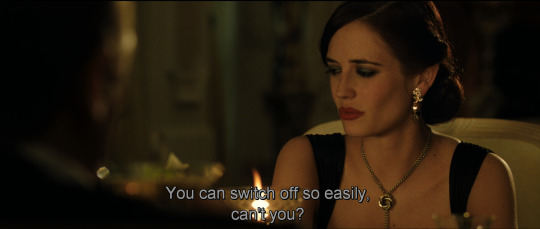


There are two people who exist: “James Bond” and “007″. One is a killer, one is not. Every time “007″ kills, it pushes “James Bond” further away from his humanity. I’m reminded of a line from “A Boy Like That” from “West Side Story” (A boy who kills cannot love/A boy who kills has no heart) that seems quite applicable to the character of James Bond, be it the literary or the film Bond. And the unfortunate curse of his profession is his licence to kill ends up being a double-edged sword. Or, as Dominic Greene says in “Quantum of Solace”:
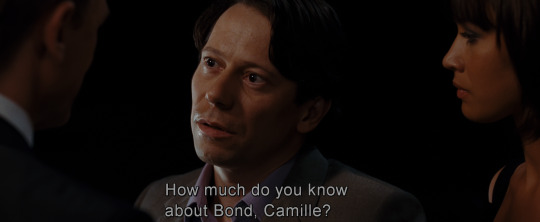
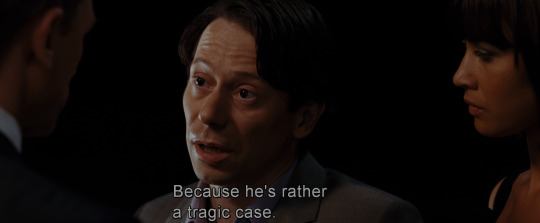
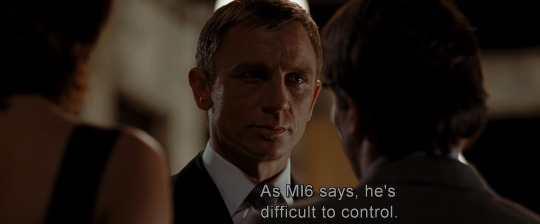

The tragedy at the core of “Casino Royale” is this fundamental divide within the character — if he holds onto his power over death, then everything he loves is doomed to die. James Bond’s identity is murder and death. But he yearns, so desperately, for connection. He is the Dangerous Lover fully. When he meets Vesper, he immediately falls for her and is willing to give up his everything for her but it is of no use. Vesper betrays him out of her own past attachment — honeypotted into a romance used to blackmail her — and she kills herself to spare Bond’s life. Yet, in pure irony, by saving Bond’s physical life she killed his humanity.
It is fitting in “Casino Royale” that the iconic line of the cinematic Bond (”Bond, James Bond”) doesn’t appear until right at the end of the film when Bond shoots the man responsible for the decision Vesper made. We are linking his identity to this act, that the choice Vesper made to save him drove him into being who we (the audience) know him as — a killer. His heart is sealed off when he uses that nasty, five-letter word in reference to Vesper.
If the ending of “Casino Royale” positions the character at his lowest — a totally heartless killer devoid of any humanity — then everything subsequent shows some kind of transformation out of that place. Drama is movement, after all. Stagnation is the enemy of functional storytelling.
“Quantum of Solace” features Bond wandering through the desert and restoring water to a thirsty people. The symbolism of this plot-beat is fairly straightforward — despite all his best intentions, there is a capacity for this killer to give life instead of just taking life. That bargain he made at the beginning of “Casino Royale” is not permanent (powers over death in exchange for your humanity/soul). He can emerge out of the desert and find rebirth. Transform into something new, restore what was lost.

The ending shot of “Quantum of Solace” — featuring Vesper’s jewel given to her by the honeypotter (is that word?) — is such a powerful image. It’s as if Bond is separating himself from his feeling, from his humanity. Committing to the life of a killer.
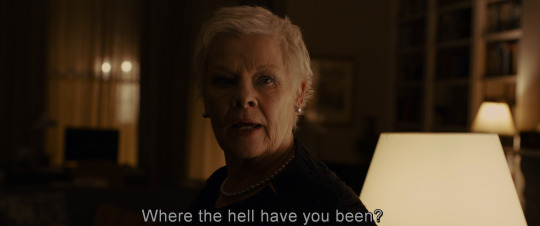

I have a whole thing about the use of silhouette in “Skyfall” and how Silva exists as a shadow-self of Bond’s anger towards M (which, I think, projects onto the death of his biological mother as every mythic hero has two sets of parents). Silva and Sévérine are a perverted mirror of Bond’s metatextual legacy, with the ending of the film arguing that there is something salvageable within this character with such a misogynistic legacy:
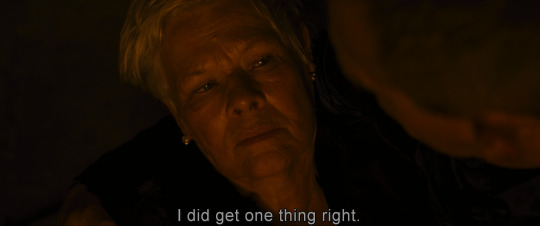
M, the surrogate mother, dies and gives Bond this last word — “I did get one thing right.” The goal of every parent, one imagines, is to not completely fuck up their child. M did fuck up Tiago Rodriquez (birthing Silva) but did not do the same to Bond. James Bond had every opportunity to end up like Tiago Rodriquez (literally “dying” and ending up with a clean slate to do whatever he wants with), but he returned when he found out MI6 (M, his “mother”) was in danger and worked to protect her. Because he loves her — despite sealing his heart off all those years ago, he still does love. That’s what she got right, maintain that humanity within Bond that so many others in this profession lose when they exist within death.


That man Bond shot at the end of “Casino Royale”, Mr. White, returns in “Spectre” — the key to Bond unraveling the mysterious organization that threatens global stability. Only this Mr. White is not the master assassin we last saw him as in “Quantum of Solace”, now he is frail and weak. Isolated. Mr. White abandoned the cause after the organization started targeting women and children, and now he waits for death to come for him as penance for what he has done in life. White recognizes how he and Bond are basically the same person — men who bring death upon the world, which ends up drawing distance between them and humanity at large.
But Mr. White has one thing keeping him alive:

Madeleine Swann is among the more fascinating characters in any popular, brand-name movie I’ve come across. The basic conceit of her character is “What if Death had a daughter, and she was the force of Life?”. She is a doctor who worked with international organizations that travel around the world healing people. This is, obviously, the equal opposite of Bond’s “licence to kill”. How could something so healing come from a man of total destruction? Mr. White is a particularly nasty guy, yet out from him emerged her. What a beautiful, hopeful message — the spark of life will always emerge no matter how bleak its circumstances are in existence.
“Spectre” shapes like a fairy tale: this dark knight (Bond) travels to the Pale King (Mr. White) thanks to a magical ring (the Spectre Ring), and the dying King tasks him to go save the Princess (Madeleine Swann) from the wizard who killed him. But the only way the knight can save the Princess is if he throws down his sword — because what really hurts her is killing. Or, as Swann says:

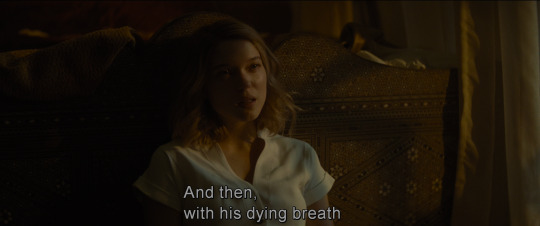

From the moment they meet, there is something different about Dr. Swann. She doesn’t just know Bond’s world — she *is* Bond’s world. She came from the same World of Death that he navigates in, yet emerged out of that a being of Life. A Doctor, the opposite of a Killer. Madeleine Swann serves as the total antithesis to the cruel belief Bond resigned himself to at the end of “Casino Royale” — life can emerge out of the underworld.
Going back to “Skyfall” for a moment, all of the stag imagery associated with Bond’s family in the film seems important — the stags antlers regrow each year. Out of the death of winter comes the rebirth of spring. New life from death

And there’s a line Silva tells Bond in his monologue where he talks about the psychological transformation MI6 makes agents go under through a parable of his childhood:
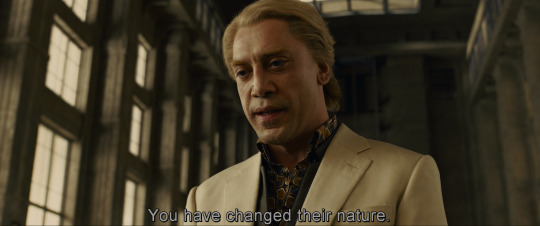
The default nature, “Skyfall” proposes, isn’t hurting but helping. We aren’t programmed to kill from birth, someone has to teach us to do that. Silva believes this is irreversible, but as we see through Bond’s journey in the film one can change their nature again back to a helper. Back to healing. Nothing is set in stone. The daughter of an assassin can become a force for life.

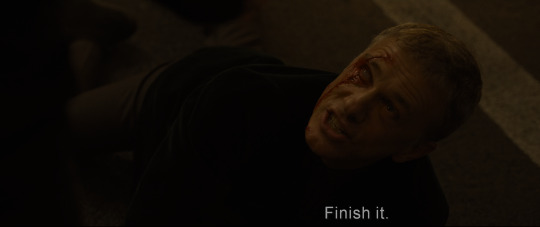

As the world’s biggest fan of “Spectre”, I’ll admit I was a bit concerned when I saw Daniel Craig was returning for one last Bond film and that Léa Seydoux was also coming back with him. I loved the ending of “Spectre” — the hero rejects the power of death (think the magical ending of “Return of the Jedi”) and embraces the love of life/life of love. He finds rebirth in this heart. His journey was complete! What more was there to tell?
Ha. Haha. Hahaha...
The trick about “No Time to Die”, dramatically, is it as much the story of Madeleine Swann is the story of James Bond. But more than anything, it is a meta-analysis of James Bond.
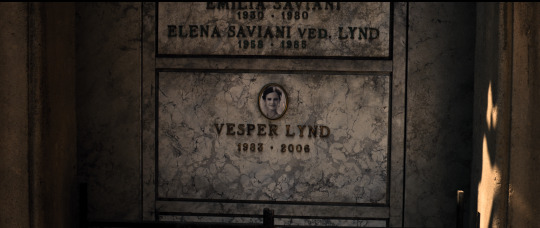
In “No Time to Die”, we return to Vesper’s grave (a beat taken from the novel “On Her Majesty’s Secret Service”, to the silly people I’ve seen on the MI6 forums or Reddit argue that the literary character wouldn’t do this).Vesper represents all of the death associated with Bond, and Swann tasks him to go to her grave to “let go”. They cannot have a future together if he cannot let go of his past. His past of killing will deny them a future. For Swann harbors a secret...
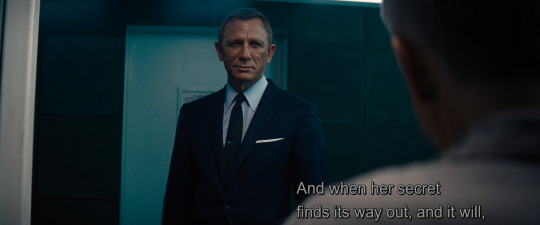

When Del Toro refers to the ending of “No Time to Die” as a cosmic checkmate, this is what he means — the base cosmological forces of life and death are in Bond’s hands, and he gets to choose which will emerge victorious. All of these films have featured him journeying to regain the humanity he lost in “Casino Royale”, the soul he loses every time he pulls the trigger of his Walther PPK. But the choice of him isn’t to throw down the weapon, the choice is for him to make the same choice M made in “Skyfall” or Vesper made in “Casino Royale” — die for love.
Madeleine Swann, as someone born of this same dark world of death, is the only one equipped to handle the psychological weight of James Bond — because they have this same pain. The first pre-title sequence of “No Time to Die”, where we see Madeleine’s mother (or Mr. White’s lover) die like the archetypal “Bond Girl” dies, grounds this in such a harrowing way. Both have seen their lives dramatically altered by betrayal of those who they loved, and because of this is betrayal it reduced the possibility of them finding restoration.

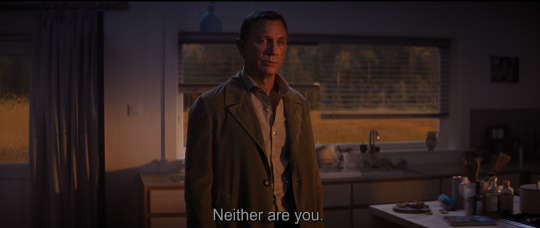
Broken in the same way. Fitting together perfectly because of it. Isn’t that love? She is life coming from death, and he is death coming from life. Equal opposites that form a perfect circle.

The inescapable irony of human existence is our attachments power us to exist but they also give us so much distress. A melted heart (good) and a broken heart (bad) are both destructive. Or, as Léa Seydoux (Madeleine Swann) described it in the marketing for “No Time to Die” — love is the promise of suffering. The love potion is the poison. That which save, kills. That which kills, saves.
At the end of “No Time to Die”, Bond could walk away and live with the knowledge that he would one day kill Madeleine Swann. His touch would one day kill her. But instead, he chooses death. He becomes a mortal man through love. He gives up everything for her. He dies *into* the relationship. As Deborah Lutz writes in “The Dangerous Lover” (40):
“The poignancy of love in romance comes from the sense that, once the full presence of love arrives, the characters will be gone; they will die in their narrative; there will be nothing left to say. Love becomes a fantasy of dying, a liebestod”.
The plotting of “No Time to Die” involves nanobots that kills on contact. Basically, it is literalizing that metaphor from “Quantum of Solace” — a literal Midas touch of death. What’s the only way for Bond to get out of this situation when he is poisoned with something that can kill the only person he loves? Let go. The only way he can have a future is if he lets go.
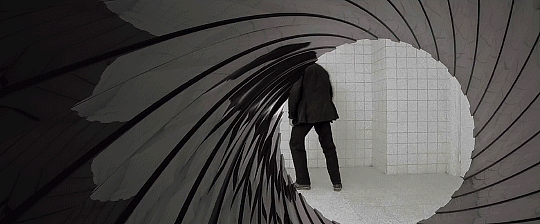

This is the magic of “No Time to Die”, and by extension the character of Madeleine Swann — cinema’s most famous killer has been transformed through her love into a life creator. The bleeding gun barrel has turned into one of light. The iconic line of the character has turned into something else entirely. Not the calling card of a killer it was in “Casino Royale”, but one of a life-giver.
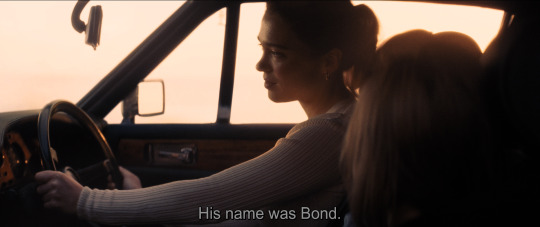

Because much as this being of life-energy could come from Mr. White, so to could something beautiful come from Bond. His eyes (eyes=soul) could pass on into something new. New life could grow from his old death. Out of love we find redemption and rebirth.
No wonder the last face we see in the CraigBond films isn’t his own, but his daughter’s. A smiling girl. With his blue eyes staring back at us...
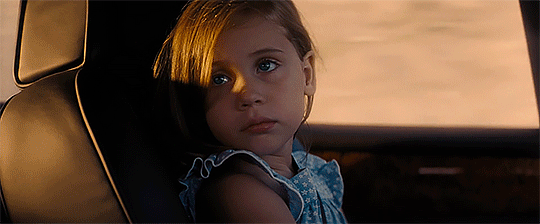
“I got one thing right.”
This is why Madeleine Swann is the love of his life. Because she *is* his life. She is the proof he can change his nature and finish his journey to find his ocean-eyed soul once again. All the cosmologic power of the divine in his hand, and James Bond lets it all go to save her. Which, by extension, saves himself.
No longer a murder. Now a man. The only thing he ever wanted to be.
#james bond#madeleine swann#craigbond#daniel craig#casino royale#quantum of solace#skyfall#spectre#no time to die#i did not intend to write this post today but it ended up just sort of spilling out onto the page#but now it is accomplished
174 notes
·
View notes